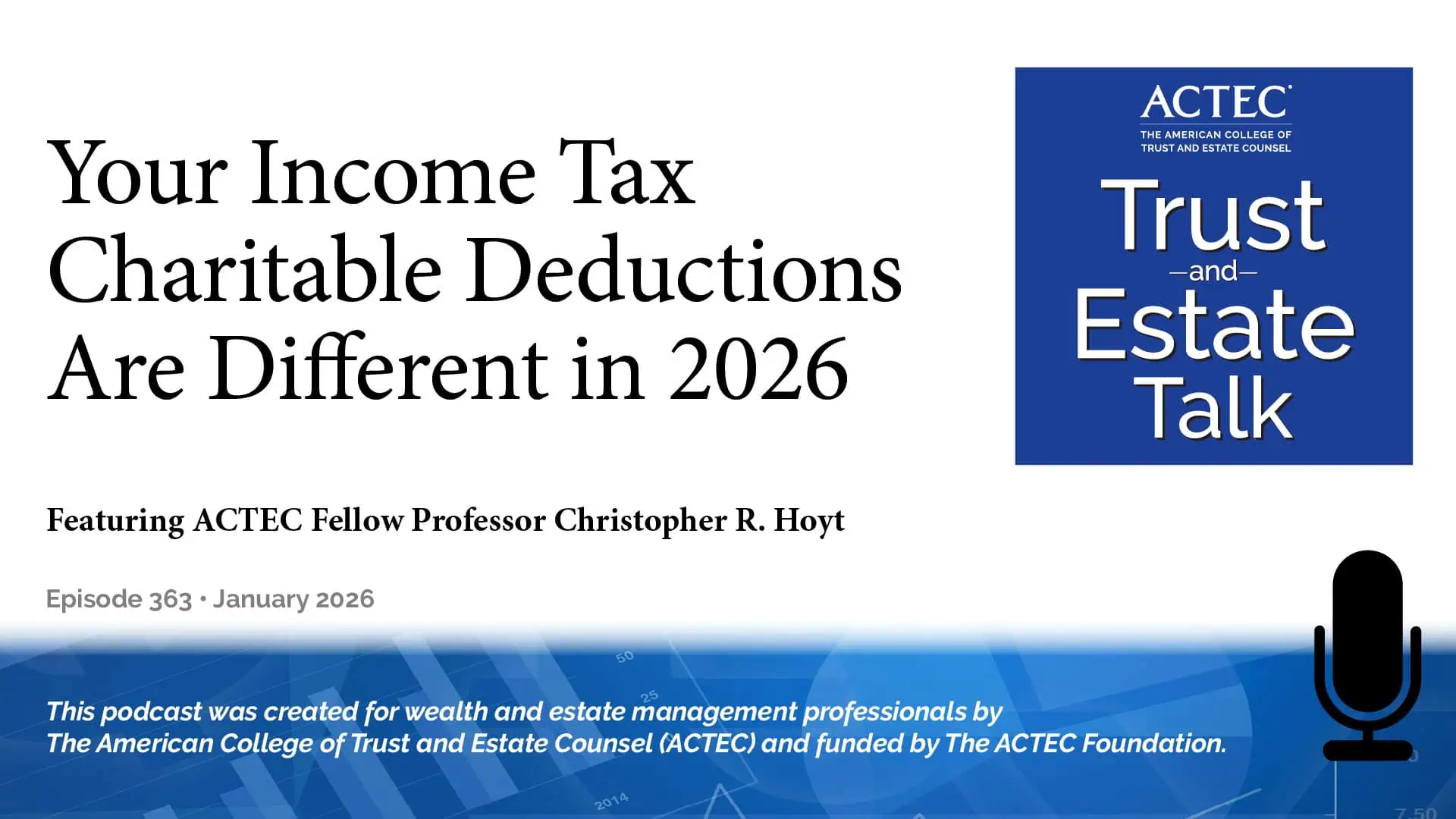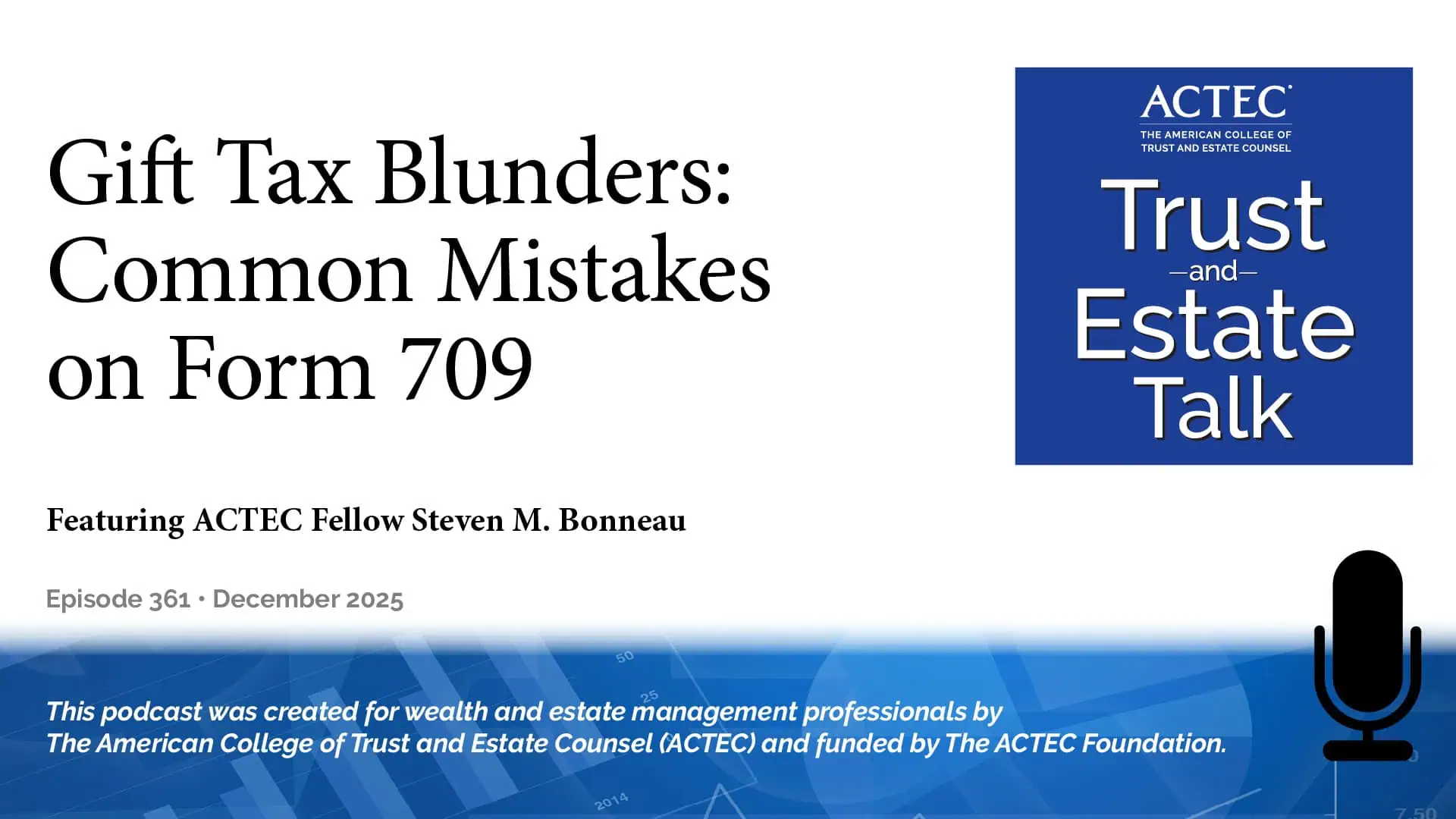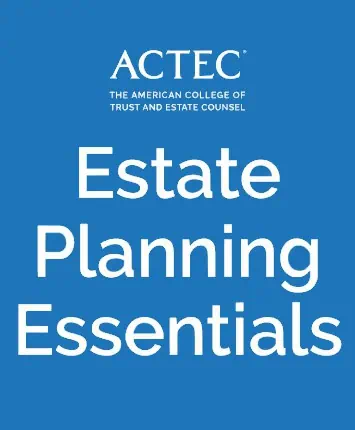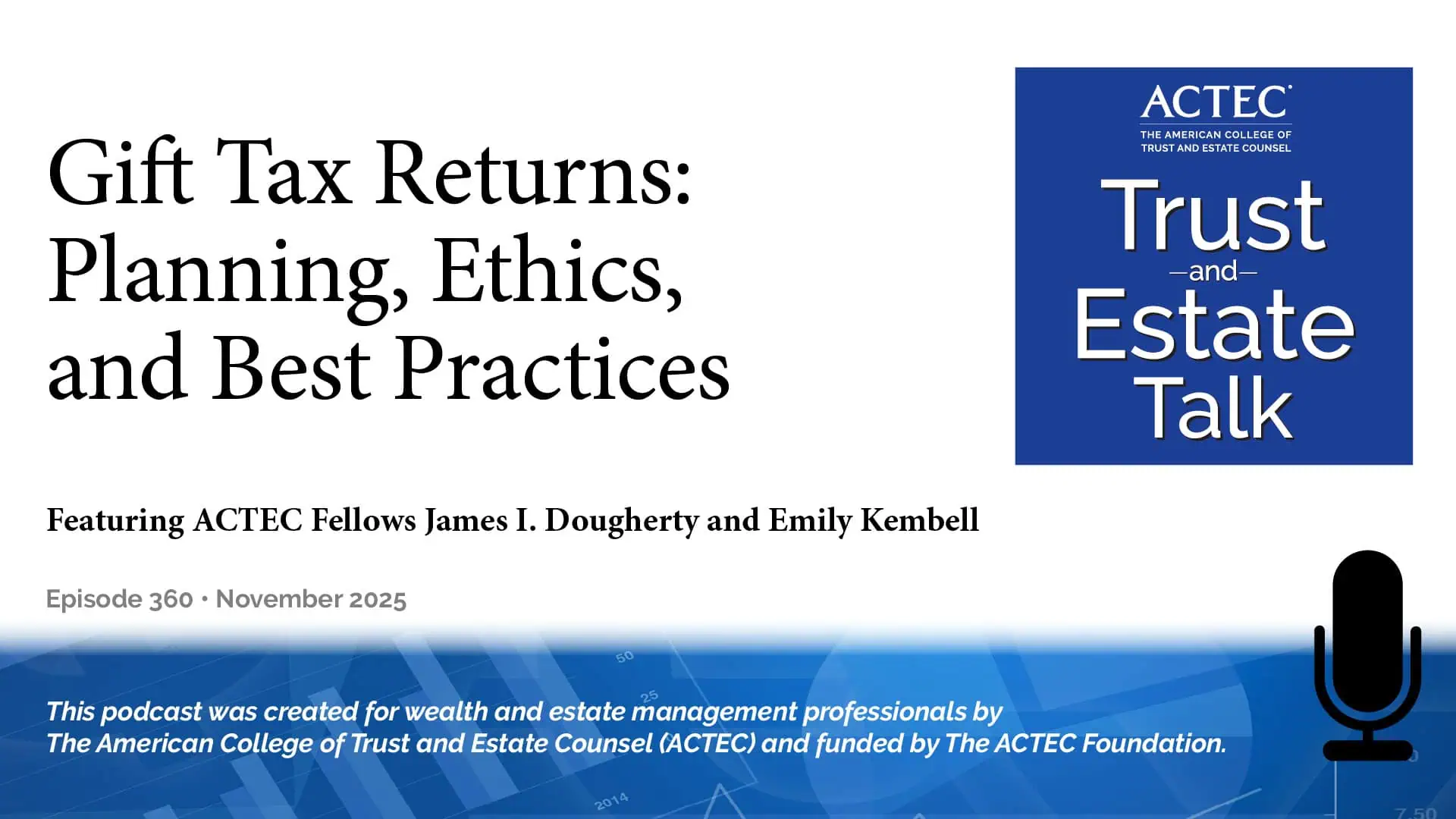Self-Employment Tax: Tax Court Curtails Limited Partner Exclusion
“Self-Employment Tax: Tax Court Curtails Limited Partner Exclusion,” that’s the subject of today’s ACTEC Trust and Estate Talk.
Transcript/Show Notes
This is Randy Harris, ACTEC Fellow from New York City.
A 2023 tax court decision, Soroban Capital Partners LP v. Commissioner, held that a partner could qualify for the limited partner exclusion from self-employment tax only if the partner was a passive investor. At first glance, that means that qualifying for this exception may prevent a partner from avoiding the 3.8% net investment income tax on business income.
ACTEC Fellow Steve Gorin of St. Louis, Missouri, is with us today to discuss avoiding both taxes. Tell us more, Steve.
Overview of the Self-Employment Tax
Thank you much, Randy. Okay, so let’s talk about the first two taxes that are involved before we talk about the tools for avoiding those taxes. So first, the self-employment tax is a tax on partnership income from a trade or business. And that tax, again, applies generally to partners in a partnership or to sole proprietors in a sole proprietorship. And that is 15.3% on the first $168,600 in 2024, which is indexed for inflation. Then, beyond that threshold, it’s 2.9% until you get to $200,000 or $250,000 — depending on whether you’re single or married — and then it’s 3.8% on the excess. The employer share is deductible, so it’s a little bit less than that. The 7.65% out of the 15.3 is deductible, and 1.45% out of the 2.9 or 3.8 is deductible. So that’s the self-employment tax.
Net Investment Income Tax
Then we have the net investment income tax, which is a 3.8% tax. Generally, that is going to be on net investment income, which is basically interest, dividends, etc., but it also applies to passive business income. And the threshold amount for that is, once you have modified adjusted gross income, that’s this over, depending on who it is, $250,000 married filing jointly, $125,000 married filing separately, $200,000 for single, $15,200 for trusts. But we’re not concerned about trusts because those don’t pay self-employment tax, so we’re really going to be talking more about individuals here.
Limited Partner Exclusion from Self-Employment Tax
The self-employment tax, we would like to avoid it, and the statute provides for an exception for limited partners. And the legislative history says that you can be a general partner and a limited partner and be taxed only for self-employment tax only on the general partner share. But the tax court in the Soroban case took it a step further and said not only does it need to be a state law limited partnership interest or the equivalent in an LLC, but you also have to be a passive investor in this. And the literal language that they use is that “you have to be a passive investor.”
Strategies to Avoid Both Self-Employment and Net Investment Income Taxes
So, how can you be a passive investor for self-employment tax purposes and avoid the net investment income tax on passive investment income? The answer has to do with getting into a little bit more complicated structure than we normally would like to use.
So what you do is you form a limited partnership, and in a limited partnership the general partner is the one who controls everything, and the limited partner is, again, just generally a passive investor. But the limited partner statutes don’t require you to be a passive investor. It’s just that the tax court is now putting this overlay onto this. So, if you have a state law limited partnership and you have an S corporation being the general partner, then the individual can participate in the activity by being an employee of the S corporation.
The Role of Limited Partnerships and S Corporations
So the idea is that each of these limited partners who wants to avoid self-employment tax and end-of-investment income tax would be:
- in a limited partnership;
- an owner of the S corporation that is the general partner; and
- actively working for the S corporation in the S corporation’s role of managing the business that the limited partnership is running.
So, what we’re doing is we’re taking our activity for the S corporation and we are imputing it to the ownership of the limited partnership for purposes of net investment income tax.
Group Activities and the Net Investment Income Tax
Now, the net investment income tax does have a grouping rule. So basically, if you have two businesses that have common ownership and they have some kind of commonality of activities — and there’s, of course, a lot of details in the regulations — then you can take your activity in one of those group activities and impute it to the other.
In this case, the S corporation’s operation of the business is the activity that you’re doing, and then the grouping rules that apply for the net investment income tax allow you to take your activity for that S corporation and impute it to your limited partner interest for purposes of the net investment income tax.
Threading the Needle
But the self-employment tax does not have any kind of aggregation like that. So that’s how you thread the needle, and you’re going to be active for net investment income tax purposes, and for self-employment tax purposes, you’re just a limited partner. You’re not participating in your capacity as a limited partner; you’re not participating in your capacity as a partner at all. You’re participating in your capacity as an employee of the S corporation that’s a general partner. So that’s how you do it, and if you have any questions, I would certainly be happy to talk with you further.
Randy Harris: Thank you, Steve, for that very helpful presentation.
Additional Info
- Business Planning Podcasts — Business owners must carefully plan for succession, taxes and the forever-changing economic landscape. Be aware of the trust and estate impacts from the Fellows of The American College of Trust and Estate Counsel.
- IRS / Tax Guidance Podcasts — Understand IRS guidance and impacts of new tax laws from the trust and estate experts at The American College of Trust and Estate Counsel.
Latest ACTEC Trust and Estate Talk Podcasts

Your Income Tax Charitable Deductions Are Different in 2026
Learn how the 2026 tax law changes impact charitable deductions, SALT limits, and QCD planning—especially for donors over age 70½ and high-income taxpayers.

Loss of the Portability Election: Estate of Rowland v. Commissioner
A look at Estate of Rowland v. Commissioner and how incomplete estate tax returns can void a portability election and cost estates valuable DSUE.

Gift Tax Blunders: Common Mistakes on Form 709
Common Form 709 mistakes can trigger costly GST and gift-tax consequences. ACTEC experts explain how to spot and fix DSUE, GST allocation, and gift-splitting errors.



